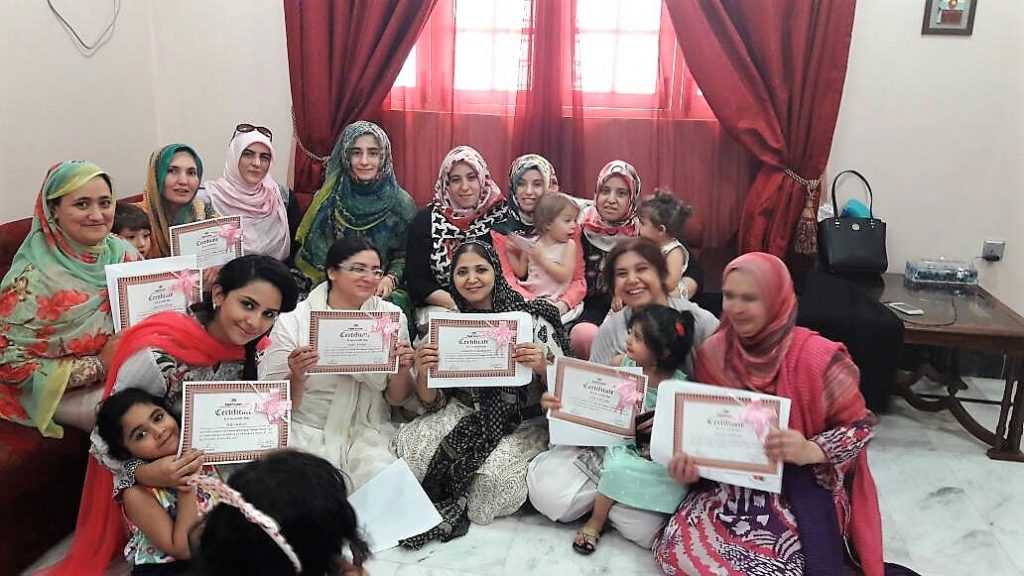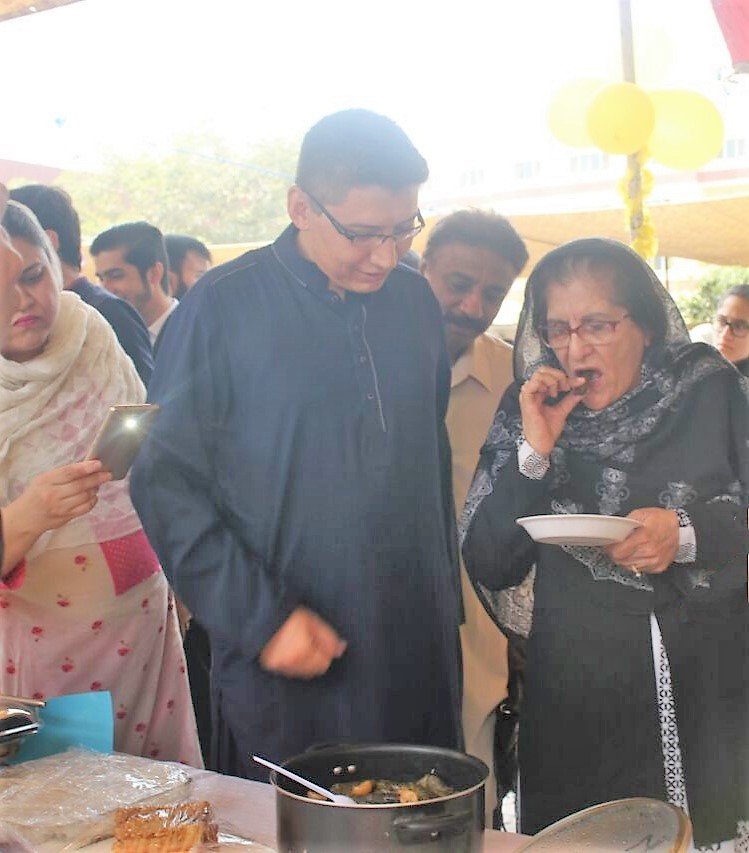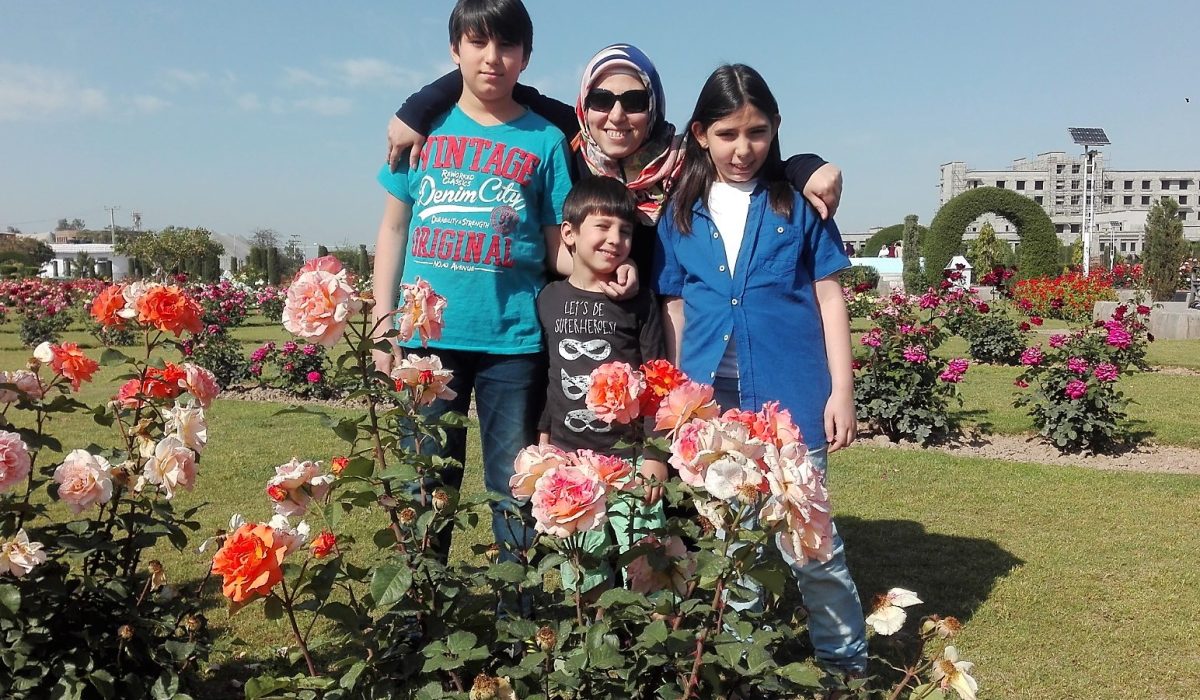Education volunteer Sevda Arslan (3): My children wish their ties with Pakistan to continue, my daughter considers becoming a citizen there

Education volunteer Sevda Arslan (2): If we went to Pakistan again, we would love to live in Peshawar as a family
October 6, 2021
Pakistan’s sad day: 20 people lost their lives in 5.9 earthquake
October 7, 2021Sevda Arslan, who lived in Pakistan for 13 years and raised her three children there, narrates the process of leaving the country and how her family was affected by the ordeal. Drawing attention to the importance of sharing memories, Arslan says, “I think the memories shared here are like preliminary preparations for those who wish to live anywhere in the world and engage in voluntary activities.”
What did you experience in the process of leaving Pakistan?
Everything happened so quickly. Those were the days when the Turkish administrative and teaching staff of our institutions awaited the extension of their visas. After our cultural festival in Peshawar, a prolific event, the crisis that would cause our leaving the country struck. Our activities like Bake-Sale Bazaars and ‘Cooking Classes’ made us so close with the public in Pakistan that they were always there for us when the troubles started. They did everything they could to stop us from leaving. Among those who attended our events were the wives of the prominent people of the city. They tried so hard for us to stay in the country. They applied to the official authorities. Suddenly, the official authorities had ordered us to leave Pakistan within three days. We were grief-stricken. Following the applications made to the United Nations High Commission for Refugees (UNHCR), all the Turkish educators and their family members affected by the crisis were given asylum protection certificates valid for one year. In those days, our friends in Peshawar formed a group and brought food to our homes for a few weeks as if they sent food to homefolk grieving over a dear departed. We were so impressed with that gesture.
When our Pakistani friends left our house after a visit in those days, I found a bag containing gold jewellery while tidying up. Since we were no more allowed to work at the school, our friends had left that bag secretly thinking we no longer could get salaries. I guessed that anonymous kind-hearted soul. I took the bag to her home and returned it with heartfelt thanks. Our children continued attending the school. Their teachers collected small amounts and handed them to our children. I learnt about this recently. My daughter told me, “Mom, Aunt I always gave us pocket money.” She had not said it then, she says it only now.
The abduction of the Kaçmaz family also worried us. Our children’s passports were about to expire. We took a decision in 2018. We could tell no one. We had to leave without saying goodbye to many of our friends. It was tough.
What place does Pakistan have in your children’s world?
My first son, Bahadır, was a new-born when he arrived in Pakistan. My daughter Ayşe Selma and my younger son Ömer Cemal were born in Pakistan. My children’s biggest dream is to go to Pakistan again. Recently, my daughter asked, “What would you say if I went there after turning 18 and became a Pakistani citizen?” When she asked me so, I said ‘no need’ at first. Now I wonder if I did wrong. Maybe she wishes that bond to last. We lived in Pakistan for 13 years. Our children grew up there. They feel Pakistani because their childhood memories are there.
My daughter says, “One day I forgot to bring a pencil to the school. I snapped a classmate’s pencil in the classroom and took one half. She had noticed but didn’t speak up. After a while, I took the pencils from the house and distributed them to the whole class, so that I could return her pencil. I couldn’t confess. I know my act was not permissible.” I remember that too, there was a bunch of pencils at home. She had asked me, “Mom, can I distribute these to my classmates?”
NO DAY PASSES WITHOUT MENTIONING PAKISTAN AT HOME
My children would say, “We wish to be Pakistani to eat those dishes. Prepare us Pakistani food every day.” I later discovered the children exchanged lunches with one another at school. Our Turkish dishes are spice-free. My children used to say, “It tastes bland, Mom. We wish we were Pakistani too!” Pakistani children were curious about our food as well and sometimes they did not wish to offend my children; so, they shuffled meals among themselves. Pakistani children would eat at our homes whenever they visited, but they never complained. I’m sure they found it very difficult to eat our meals too. It must have tasted bland to them. Nowadays, both children and I find Turkish style white rice fairly bland. We still cook Pakistani food once or twice a week.
How did the problems you faced in Pakistan lastly affected children?
They cried a lot as they left. They wept all the way in the plane. When it was time to leave Africa, they asked, “This time we’re going to bid farewell properly, right?” because parting without saying goodbye affected them the most last time. “What does the ‘president’ of the country we are going look like?” they asked. Wherever they go, my children always have a desire to return to Pakistan. They cannot accept we cannot go there anymore. Even if we do not, they want to go. One of Bahadır’s teachers in Africa was from Pakistan. That was very good for him. Wherever we went, they chose their friends from Pakistanis. Bahadır imitates Pakistani English accent fluently. When they started school in Africa, they wondered, ‘Is there any Pakistani in our classroom?’ They did not even think whether there were Turks.

We entered a store here while back-to-school shopping. It smelled like Pakistan. We discovered there was a Pakistani restaurant nearby. We had Pakistani food there, relaxed and very happy. There is not a day without mention of Pakistan in our home. Maybe one day they will serve there, maybe Allah is preparing them for that.
How do your Pakistani friends comment on your departure?
We parted without saying goodbye, but we kept in touch afterwards. They continue the tradition of ‘Cooking Classes’ among themselves. They send photos showing they prepared the treats we used to prepare together or they bought the same tea glass set, etc.
They know every development. We were always been frank with them about the incidents back in our home country and their causes. We chatted about the stance of the authoritarian regime in Turkey incumbent for the last few years. They experienced similar stifling periods in the past. Unfortunately, the Middle East and the surrounding geography are no strangers to such happenings. A Pakistani friend who I know admires the leaders in Turkey said, “Such things happened to all the prophets and their communities. It’s very normal for you to experience this. Of course, it will be like this and you will not be understood!” I was surprised she said these, but this is also another facet of those people. They know and can establish a cause-effect relationship in their own way.
I WAS MOST IMPRESSED BY PEOPLE’S PATIENCE
When I first arrived in Pakistan, I also thought how I and my colleagues could be more active; this was how we decided on the “Class Moms” campaign. We invited students to our homes and hosted them for their study programs. A class came to my house just like that. Years passed, but those students still remember me that way. I recently attended their meeting online. They reminded me, ‘We came to your house and we ate such-and-such’. One even said, “I can never forget the aroma of your house.” However, the students were sometimes reluctant to attend. I used to prepare treats for them and served them. I also tried meeting their mothers.
Do you have any memories of people you cannot forget?
There was an elderly Pakistani lady who performed the Umrah and stayed in a Turkish hotel in Madinah. She liked the lentil soup and some other Turkish dishes there. When she returned to Pakistan, she asked to her neighbour, “Do you know any Turks here?” Turned out her neighbour was one lady who regularly attended our cooking classes. They arrived for the cooking class together that week. The instant that elderly Pakistani lady saw me, she exclaimed, “I saw you in Madinah!” She must have mistaken me for someone else, but that was how Allah showed her. We socialized with that elder sister for 6-7 years in Islamabad. Later, we moved to Lahore. I changed my phone number and we lost touch. That lady and her family were well-off, they used to visit Europe and stay there for a long time. Lahore is a very large city. We had a blue car. One day, on the road, two jeeps stopped in the lane next to us. The elderly Pakistani sister, whom I had not seen all those years, got off a jeep and came saying ‘Sevda! Sevda!’. She was a pious woman who immediately recognized our family car when she saw it in Lahore. It turned out she also had a house in Lahore. We met with such an exquisite synchronicity and kept in touch afterwards. Friendships continue. Wherever we go, we cannot leave Pakistan. There were also Pakistanis working in Africa. Among them was one who distributed merit scholarships to many students with limited means. Her husband was a businessman in the USA. Later, when she moved to the United States, she met some Turkish friends there, too.
In your opinion, what kind of a country is Pakistan? What impressed or affected you the most? What’s left in your life from Pakistan?
I was impressed by people’s patience the most. Just as people try to complete what they lack in themselves, I found them as commendably patient, calm, and nonaggressive. Since I’m not like that, I always took their conduct as an example. At times, this ease proved challenging while following official work, but it was also informative. They are very romantic and emotional people. They act with their hearts. I guess I lack this aspect significantly. I’m more realistic. Sometimes I think, how did we prepare food and invite guests in that heat when there were power cuts? It means you do not notice it amidst experience. Agonies disappear, aftertastes remain. Even our experiences in the home stretch in Pakistan showed us it was all a manifestation of the Divine Providence and that our time there was up. They are very nice and friendly people. The cuisine is unforgettable. That sharp aroma bothers you at first, then becomes a part of your life and something you miss. Nothing in life stays the same. I learned this in Pakistan.

PAKISTANI DOCTORS ARE VERY COMPASSIONATE
When I gave birth to my second baby, I was alone there. My first son was also 13 months old. I thought, “My husband will care for me”, but he also wished to hurry to school. I gave birth on Wednesday and returned home Thursday morning. My husband went to school that day because his students had a study schedule. When he told them, “Our daughter was born yesterday,” even his students were very surprised how he came to school. I didn’t know this then. I was heartbroken and resentful towards him then, he might have stayed at home and not gone to the school. Even today I think he should have stayed at home in those days. One of my husband’s students at that time later became my son’s teacher at a school in Africa. There he said to my husband, “You had come to the school to lecture us on the day Ayşe Selma was born. I had been most impressed with that!” It means such sacrifices impress people. I still think people should devote their time to their families. My husband stayed with me after my third birth and took care of me for a week.
Pakistani doctors are so patient and compassionate that I did not want to see midwives and doctors who shouted irresponsibly during childbirth in some hospitals in Turkey. This is why I chose to give birth in Pakistan. Their compassionate demeanour is praiseworthy. They apply massage, stand by you and encourage you by saying “It will soon pass”. They recite the Qur’an at your side. These impressed me a lot. Their manners are so beautiful. Not a single person yells. Doctors and patients can communicate efficiently. I was very comfortable. I always recommended my friends to give birth there. I attended the deliveries of many of my friends as a companion, held their hands, and tried to boost their courage. I used to say to my expecting friends in other countries, “Find a Pakistani doctor!” My sister could come to care for me three months after the birth of my daughter. She stayed with me for 6-7 months. She loved Pakistan very much. My parents and siblings were never worried, they knew the country’s environment.
As Turkish educators there, we took great care of one another in birth or sickness. We used to send food to one another.
Pakistani children are very well-behaved, very calm. I asked a friend with 5 children the reason and she replied, “You interfere with your children a lot, we do not interfere. You carpet your houses entirely, then worry it will get dirty. We don’t have carpets in our homes. After the morning prayer, I recite 7 Ayat-al Kursi and 7 Fatiha on my children so that they grow as ‘faithful, calm, obedient’”. She had told me not to interfere too much even if the house got messy. We try to do everything ourselves and this can sometimes be a reason to brag. Among those who easily use maids there, there are also those who think “the people in need should also benefit from what is bestowed on us”.
LET OTHERS NOT MAKE OUR MISTAKES
People add value to places. Even if there is no institution somewhere, there are always things to do. And if you are, it can transform into a paradise on earth. Actually, it’s in our hands. A friend who migrated to Canada said, “This is a very nice and organized country, but I miss the barefooted kids in Pakistan!” Such conditions wreak havoc on us, I wish it were not so. We do not wish to see Muslim countries in this neglected state, but it is crucial to undertake tasks at any stage. For example, organizing qurbani drives on Eid al-Adha or supporting those smart children with the best educational opportunities… Actually, these develop us a lot, you see there are other worlds.
The memories shared here are like preliminary preparations for those who wish to live anywhere in the world and engage in volunteer activities. These memories are significant experiences not only for Pakistan but also for those who will go to other countries, things that will tell you how to perceive there. I believe it is necessary to live in a way intertwined with the culture of respective countries worldwide and reflect our own culture in a constructive way. That’s why I wanted to offer an awareness rather than telling my own memories only. Let others not make our mistakes. They should not isolate themselves in small Turkeys by shutting themselves against local cultures wherever they are. Let them delay fulfilling their habits for some time. They should keep our national culture alive, but they should also be open to changes, differences and new cultures.
What are you doing in your current country?
We cherish every place where our friends are. We are endeavouring to rebuild together. Actually, I wish younger people to do these things, but I started again with a new enthusiasm.
End.
***





No Comment.